高中英语教研组活动记录XX年3月17日英语教研组活动主要内容
高中英语集体备课教研活动记录
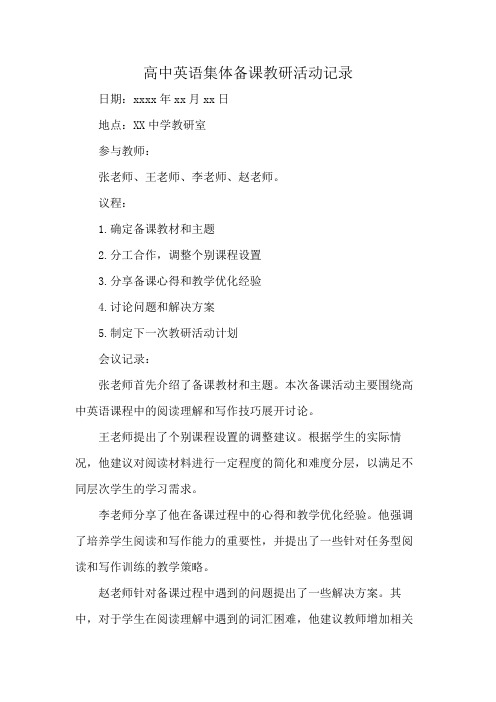
高中英语集体备课教研活动记录日期:xxxx年xx月xx日
地点:XX中学教研室
参与教师:
张老师、王老师、李老师、赵老师。
议程:
1.确定备课教材和主题
2.分工合作,调整个别课程设置
3.分享备课心得和教学优化经验
4.讨论问题和解决方案
5.制定下一次教研活动计划
会议记录:
张老师首先介绍了备课教材和主题。
本次备课活动主要围绕高中英语课程中的阅读理解和写作技巧展开讨论。
王老师提出了个别课程设置的调整建议。
根据学生的实际情况,他建议对阅读材料进行一定程度的简化和难度分层,以满足不同层次学生的学习需求。
李老师分享了他在备课过程中的心得和教学优化经验。
他强调了培养学生阅读和写作能力的重要性,并提出了一些针对任务型阅读和写作训练的教学策略。
赵老师针对备课过程中遇到的问题提出了一些解决方案。
其中,对于学生在阅读理解中遇到的词汇困难,他建议教师增加相关
词汇的教学,同时提供词汇学习资源和技巧。
最后,大家一起讨论了下一次教研活动的计划。
根据大家的意见,下次教研活动将聚焦于口语和听力训练中存在的问题,并分享相关教学资源和经验。
讨论内容涵盖了备课教材和主题、个别课程设置、备课心得和教学优化经验、问题解决方案以及下一次教研活动计划。
通过此次教研活动,教师们共同提升了备课和教学水平,并为学生的英语学习提供了更好的支持。
英语教研活动记录_高中(3篇)

第1篇Date: [Insert Date]Location: [Insert Location]Duration: [Insert Duration]Participants: [Insert Names of Participants]Facilitator: [Insert Name of Facilitator]---IntroductionThe English Research and Development (R&D) activity was conducted to enhance the teaching and learning of English in our high school. The session aimed to explore innovative teaching methods, discuss current educational trends, and share best practices among the participating teachers. The activity was structured around three main themes: integrating technology in the classroom, assessment strategies, and flipped learning.---Agenda1. Welcome and Icebreaker Activity2. Session 1: Integrating Technology in the Classroom3. Session 2: Assessment Strategies4. Session 3: Flipped Learning5. Group Discussions and Sharing6. Reflection and Conclusion---1. Welcome and Icebreaker ActivityThe session began with a warm welcome from the facilitator, followed by an icebreaker activity to break the ice and foster a collaborative environment. Participants were asked to introduce themselves and share a fun fact about themselves, which helped in building rapport among the group.---2. Session 1: Integrating Technology in the ClassroomThis session was led by Mr. John Smith, a technology specialist. He began by highlighting the importance of integrating technology in the English classroom to engage students and enhance their learning experience. The following topics were covered:- Interactive Whiteboards: Mr. Smith demonstrated how interactive whiteboards can be used for collaborative learning and interactive activities.- Educational Apps: He showcased various educational apps that can be used for vocabulary building, grammar practice, and reading comprehension.- Online Resources: Participants were encouraged to explore online resources such as educational websites, podcasts, and videos that can supplement their teaching materials.- Flipped Learning: Mr. Smith discussed the concept of flipped learning, where students watch instructional videos at home and class time is used for practice and discussion.A hands-on activity followed, where teachers were asked to create a lesson plan incorporating technology. This provided an opportunity for participants to apply the concepts discussed and share their ideas with the group.---3. Session 2: Assessment StrategiesDr. Emily Johnson, an experienced English teacher, facilitated this session. She emphasized the importance of diverse and effective assessment strategies to gauge student learning and provide constructive feedback. The following strategies were discussed:- Formative Assessments: Dr. Johnson explained the use of formative assessments, such as exit tickets, quick writes, and class discussions, to monitor student progress and address misconceptions in real-time.- Summative Assessments: She highlighted the importance of summative assessments, such as essays, presentations, and exams, to evaluate student achievement at the end of a unit or course.- Portfolios: Dr. Johnson discussed the use of portfolios to showcase student work over time, allowing for reflection and growth.- Self and Peer Assessment: She encouraged the use of self and peer assessment to develop students' critical thinking and metacognitive skills.Participants engaged in a group activity where they brainstormed assessment strategies that could be implemented in their classrooms and shared their ideas with the group.---4. Session 3: Flipped LearningMs. Sarah Lee, a pioneer in flipped learning, led this session. She began by explaining the concept of flipped learning and its benefits, such as increased student engagement and personalized learning. The following aspects were covered:- Creating Instructional Videos: Ms. Lee provided tips on how to create effective instructional videos, including scriptwriting, video editing, and incorporating multimedia elements.- Classroom Activities: She discussed various classroom activities that can be used during class time, such as discussions, group projects, and interactive games.- Student Feedback: Ms. Lee emphasized the importance of gathering student feedback to assess the effectiveness of flipped learning intheir classrooms.Participants were tasked with planning a flipped learning lesson for a specific unit and presented their ideas to the group.---5. Group Discussions and SharingFollowing the individual sessions, participants engaged in group discussions to share their insights, experiences, and challenges. This provided an opportunity for collaborative learning and the exchange of best practices.---6. Reflection and ConclusionThe session concluded with a reflection activity, where participants were asked to write down their key takeaways from the day and how they plan to implement the new strategies in their classrooms. Thefacilitator summarized the main points discussed and encouraged participants to continue the conversation and support each other intheir professional development journey.---ConclusionThe English Research and Development activity was a resounding success, providing a platform for teachers to explore new teaching methods, share their experiences, and grow professionally. The sessions on integrating technology, assessment strategies, and flipped learning wereparticularly insightful, and the group discussions fostered a sense of community and collaboration among the participants. We look forward to the positive impact these new strategies will have on our students' learning and achievement.第2篇Date: [Insert Date]Time: [Insert Time]Location: [Insert Location]Participants: [Insert Names of Participants]Moderator: [Insert Name of Moderator]Objective: To enhance the teaching methods and strategies in English language instruction, fostering a collaborative environment for teachers to share experiences and insights.---I. IntroductionThe English Department held a教研活动 (teaching and research activity) on [Insert Date] to discuss and improve the effectiveness of English language teaching in our high school. The session aimed to explore innovative teaching methods, share best practices, and address common challenges faced by English teachers.II. Opening RemarksThe moderator, [Moderator's Name], began the session with a brief overview of the objectives and the structure of the activity. Emphasizing the importance of continuous professional development, [Moderator's Name] encouraged participants to actively engage in discussions and contribute their ideas.III. Session 1: Innovative Teaching Methods1. Facilitator: [Facilitator's Name]2. Topic: "Flipped Classroom Approach"3. Summary:- The facilitator introduced the flipped classroom model, where students learn new content outside the classroom through videos,readings, or other materials, and class time is used for practice, discussion, and application.- Participants shared their experiences with implementing this method and discussed the benefits, such as increased student engagement and personalized learning.- Challenges were also addressed, including the need for students to have access to technology and the time required to create high-quality learning materials.IV. Session 2: Technology Integration1. Facilitator: [Facilitator's Name]2. Topic: "Using Technology in English Language Teaching"3. Summary:- The facilitator demonstrated various educational tools and platforms that can be used to enhance English language learning, such as Kahoot!, Quizlet, and Edmodo.- Participants discussed how these tools can be integrated into lesson plans to make learning more interactive and engaging.- A group activity was conducted to brainstorm ways to incorporate technology into different aspects of the English curriculum.V. Session 3: Assessment and Feedback1. Facilitator: [Facilitator's Name]2. Topic: "Effective Assessment Strategies and Feedback Techniques"3. Summary:- The facilitator emphasized the importance of formative and summative assessment in monitoring student progress and providing meaningful feedback.- Participants shared their assessment practices, including the useof quizzes, essays, and presentations.- A focus was placed on providing constructive feedback that encourages student growth and motivates them to improve.VI. Group Discussions and Case Studies1. Facilitator: [Facilitator's Name]2. Topic: "Addressing Common Challenges in English Language Teaching"3. Summary:- Participants were divided into small groups to discuss common challenges they face in their classrooms, such as low student motivation, diverse learning styles, and limited resources.- Each group presented case studies of real-life situations they have encountered and shared strategies for overcoming these challenges.- The discussions highlighted the importance of empathy, adaptability, and continuous learning.VII. Feedback and Reflection1. Facilitator: [Facilitator's Name]2. Topic: "Reflection on the Activity and Next Steps"3. Summary:- Participants provided feedback on the activity, expressing appreciation for the opportunity to learn from each other and the valuable insights gained.- The moderator encouraged everyone to implement at least one new teaching strategy from the session in their classrooms and to sharetheir experiences with the group in the next meeting.- A plan was made for the next教研活动, which will focus on "Enhancing Reading Comprehension Skills."VIII. ConclusionThe English Department's教研活动 was a resounding success, providing a platform for teachers to exchange ideas, share best practices, and collaborate on ways to improve English language instruction. The participants left the session feeling motivated and inspired to bring new ideas and strategies into their classrooms.---End of Record第3篇Date: [Insert Date]Time: [Insert Time]Location: [Insert Location]Participants: [Insert Names of Participants]Facilitator: [Insert Name of Facilitator]Objective: To enhance teaching strategies and explore innovative approaches to teaching English in the high school setting.---I. IntroductionThe English教研活动 began with a brief introduction by the facilitator, who outlined the objectives for the session. The focus was to discuss effective teaching methods, share best practices, and explore new resources and technologies that could be integrated into the English curriculum.II. Welcome and Opening RemarksThe facilitator welcomed all participants and emphasized the importance of continuous professional development in the field of English education. They highlighted the need to adapt teaching methods to cater to thediverse needs of high school students and to prepare them for the challenges of the modern world.III. Presentation on Teaching StrategiesThe first segment of the activity involved a presentation by a guest speaker, who is an experienced English teacher. The speaker shared various teaching strategies that have been successful in their classroom. Some of the key points discussed were:1. Flipped Classroom Model: This approach involves students learning new content outside of class through videos or readings, and then usingclass time for practice and discussion. This allows for more interactive learning and personalized instruction.2. Project-Based Learning: Encouraging students to work on real-world projects that require them to apply English skills in a practical context. This can include writing reports, creating presentations, or participating in simulations.3. Interactive Whiteboards: Utilizing interactive whiteboards to enhance engagement and facilitate collaborative learning. Activities such as word searches, vocabulary quizzes, and interactive storytelling were highlighted.4. Technology Integration: Discussing the use of educational apps and online platforms like Kahoot!, Quizlet, and Edmodo to make learning more dynamic and engaging.IV. Group Discussion and Sharing of Best PracticesAfter the presentation, participants were divided into small groups to discuss the strategies presented and share their own experiences. The groups were encouraged to identify the challenges they face in their classrooms and brainstorm potential solutions. Some of the points raised during the discussions included:- Differentiated Instruction: Recognizing the diverse learning stylesand abilities of students and tailoring instruction accordingly.- Student Engagement: Finding ways to make lessons more interactive and engaging to maintain student interest.- Assessment: Developing effective and fair assessment methods that provide meaningful feedback to students.Each group presented their findings to the larger group, and the facilitator provided feedback and additional insights.V. Workshops on Technology IntegrationThe next part of the activity involved a series of workshops designed to introduce participants to new technologies that can be used in the classroom. The workshops covered:1. Creating Interactive Presentations with Google Slides: Participants learned how to create engaging presentations that include multimedia elements and interactive quizzes.2. Using Twitter for Classroom Communication: Discussing the potential of Twitter as a tool for classroom discussions, sharing resources, and connecting with a global audience.3. Introducing Coding to English Classrooms: Exploring the use of coding to teach language and logic skills through platforms like Scratch.VI. Feedback and ReflectionAt the end of the activity, participants were asked to reflect on the day's events and provide feedback on the workshops and discussions. The feedback was overwhelmingly positive, with many participants expressing a desire to incorporate new strategies and technologies into their teaching practices.VII. ConclusionThe facilitator concluded the activity by summarizing the key takeaways and emphasizing the importance of ongoing collaboration and support among English teachers. They encouraged participants to continue sharing ideas and resources through professional networks and social media platforms.VIII. Action PlanTo ensure that the outcomes of the activity are implemented effectively, the following action plan was proposed:- Follow-up Meetings: Schedule regular follow-up meetings to discuss progress and challenges.- Resource Sharing: Create a shared platform for teachers to share resources and best practices.- Workshops and Training: Organize additional workshops and training sessions on specific topics as needed.---This English教研活动 provided a valuable opportunity for high school English teachers to enhance their skills, share best practices, and explore innovative teaching methods. The activities and discussions were engaging and thought-provoking, and the participants left the session with a renewed sense of enthusiasm and commitment to their professional development.。
高三英语教研组活动记录
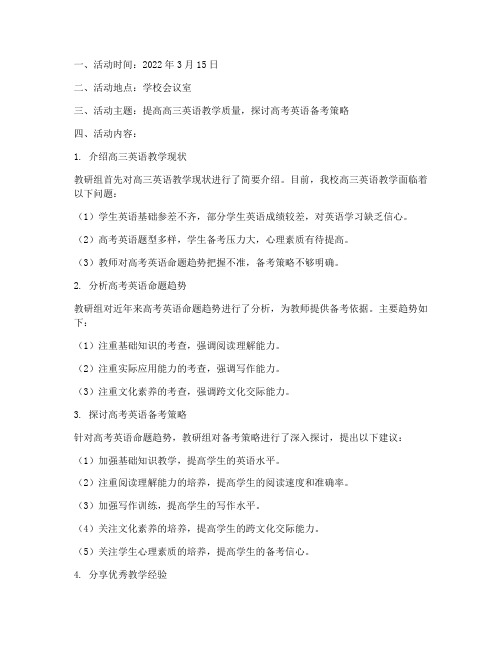
一、活动时间:2022年3月15日二、活动地点:学校会议室三、活动主题:提高高三英语教学质量,探讨高考英语备考策略四、活动内容:1. 介绍高三英语教学现状教研组首先对高三英语教学现状进行了简要介绍。
目前,我校高三英语教学面临着以下问题:(1)学生英语基础参差不齐,部分学生英语成绩较差,对英语学习缺乏信心。
(2)高考英语题型多样,学生备考压力大,心理素质有待提高。
(3)教师对高考英语命题趋势把握不准,备考策略不够明确。
2. 分析高考英语命题趋势教研组对近年来高考英语命题趋势进行了分析,为教师提供备考依据。
主要趋势如下:(1)注重基础知识的考查,强调阅读理解能力。
(2)注重实际应用能力的考查,强调写作能力。
(3)注重文化素养的考查,强调跨文化交际能力。
3. 探讨高考英语备考策略针对高考英语命题趋势,教研组对备考策略进行了深入探讨,提出以下建议:(1)加强基础知识教学,提高学生的英语水平。
(2)注重阅读理解能力的培养,提高学生的阅读速度和准确率。
(3)加强写作训练,提高学生的写作水平。
(4)关注文化素养的培养,提高学生的跨文化交际能力。
(5)关注学生心理素质的培养,提高学生的备考信心。
4. 分享优秀教学经验教研组邀请了具有丰富教学经验的教师分享优秀教学经验,为其他教师提供借鉴。
以下为部分优秀教学经验:(1)制定合理的教学计划,确保教学进度和质量。
(2)关注学生的个体差异,因材施教。
(3)运用多种教学方法,激发学生的学习兴趣。
(4)注重课堂互动,提高学生的参与度。
(5)关注学生的情感需求,关心学生的心理健康。
5. 总结与展望教研组对本次活动进行了总结,并对未来工作进行了展望。
主要内容包括:(1)加强高三英语教学研究,提高教学质量。
(2)关注高考英语命题趋势,及时调整备考策略。
(3)加强教师队伍建设,提高教师业务水平。
(4)关注学生心理健康,营造良好的学习氛围。
五、活动总结:本次高三英语教研组活动取得了圆满成功,教师们对高考英语备考策略有了更深入的认识,为提高高三英语教学质量奠定了基础。
高中英语学科教研记录(3篇)
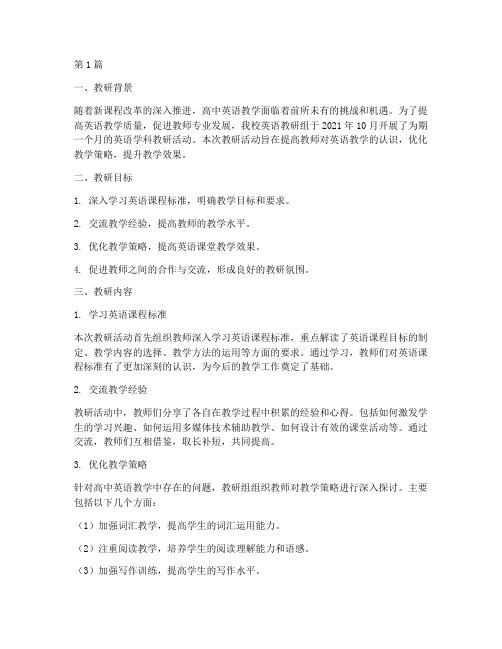
第1篇一、教研背景随着新课程改革的深入推进,高中英语教学面临着前所未有的挑战和机遇。
为了提高英语教学质量,促进教师专业发展,我校英语教研组于2021年10月开展了为期一个月的英语学科教研活动。
本次教研活动旨在提高教师对英语教学的认识,优化教学策略,提升教学效果。
二、教研目标1. 深入学习英语课程标准,明确教学目标和要求。
2. 交流教学经验,提高教师的教学水平。
3. 优化教学策略,提高英语课堂教学效果。
4. 促进教师之间的合作与交流,形成良好的教研氛围。
三、教研内容1. 学习英语课程标准本次教研活动首先组织教师深入学习英语课程标准,重点解读了英语课程目标的制定、教学内容的选择、教学方法的运用等方面的要求。
通过学习,教师们对英语课程标准有了更加深刻的认识,为今后的教学工作奠定了基础。
2. 交流教学经验教研活动中,教师们分享了各自在教学过程中积累的经验和心得。
包括如何激发学生的学习兴趣、如何运用多媒体技术辅助教学、如何设计有效的课堂活动等。
通过交流,教师们互相借鉴,取长补短,共同提高。
3. 优化教学策略针对高中英语教学中存在的问题,教研组组织教师对教学策略进行深入探讨。
主要包括以下几个方面:(1)加强词汇教学,提高学生的词汇运用能力。
(2)注重阅读教学,培养学生的阅读理解能力和语感。
(3)加强写作训练,提高学生的写作水平。
(4)开展口语交际活动,提高学生的口语表达能力。
4. 课堂观摩与反思教研组组织教师观摩优秀教师的课堂,并对其教学进行反思。
通过观摩,教师们学习到了优秀教师的课堂教学技巧,同时对自己的教学进行了反思,找到了自身的不足,为今后的教学工作提供了借鉴。
四、教研成果1. 教师对英语课程标准的认识更加深入,明确了教学目标和要求。
2. 教师的教学水平得到提高,课堂教学效果明显改善。
3. 教师之间的合作与交流更加紧密,形成了良好的教研氛围。
4. 学生在英语学习方面取得了显著进步,成绩稳步提高。
五、总结与展望本次高中英语学科教研活动取得了圆满成功。
高中英语教研活动记录
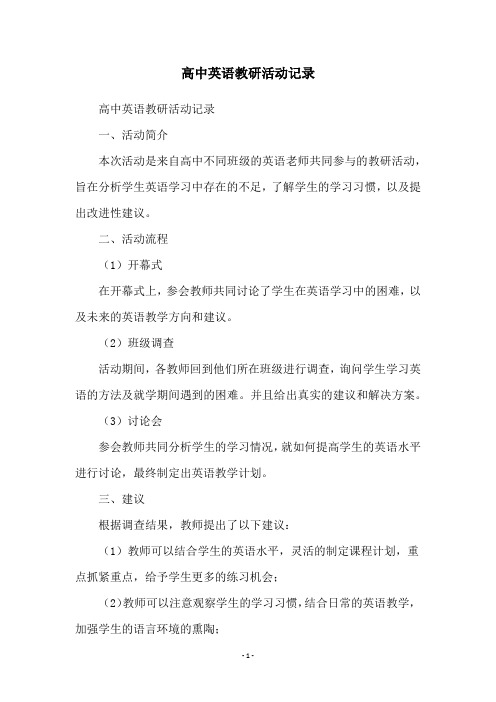
高中英语教研活动记录
高中英语教研活动记录
一、活动简介
本次活动是来自高中不同班级的英语老师共同参与的教研活动,旨在分析学生英语学习中存在的不足,了解学生的学习习惯,以及提出改进性建议。
二、活动流程
(1)开幕式
在开幕式上,参会教师共同讨论了学生在英语学习中的困难,以及未来的英语教学方向和建议。
(2)班级调查
活动期间,各教师回到他们所在班级进行调查,询问学生学习英语的方法及就学期间遇到的困难。
并且给出真实的建议和解决方案。
(3)讨论会
参会教师共同分析学生的学习情况,就如何提高学生的英语水平进行讨论,最终制定出英语教学计划。
三、建议
根据调查结果,教师提出了以下建议:
(1)教师可以结合学生的英语水平,灵活的制定课程计划,重点抓紧重点,给予学生更多的练习机会;
(2)教师可以注意观察学生的学习习惯,结合日常的英语教学,加强学生的语言环境的熏陶;
(3)教师要加强与家长的沟通,促使家长参与到孩子的英语学习之中,为孩子提供更多的帮助。
四、总结
本次活动是班主任教师及高中其他教师协作的学习英语教研活动,旨在改善学生的英语水平,提高教学质量。
虽然活动中的成就还不完善,但仍然可以看到在活动中取得了很大的成果,参加活动的老师们也都认可了这次活动的价值,并且认为这次活动是今后英语教学中的一个重要参考。
高中英语教研活动记录教研内容

高中英语教研活动记录教研内容
活动背景
近日,本校高中英语教研组展开了一次精彩的教研活动,旨在探讨如何更好地提升学生英语学习的效果,活动内容涵盖了课程教学、评估方式以及学科提升等方面。
活动内容
课程教学
1. 探讨优秀教学案例
教研组成员分享了各自在英语教学中成功的案例,包括引入多媒体教学手段、设计富有趣味性的活动、激发学生学习兴趣等。
2. 学科整合
针对英语学科,如何与其他学科进行整合教学,提高知识的综合运用能力进行深入探讨,并共同制定整合教学方案。
评估方式
1. 评估方法的多样化
教研组讨论了目前常用的评估方法,如考试、作业、口语表现等,以及如何结合多种评估方式,更全面地了解学生的学习情况。
2. 激励机制
讨论了设置激励机制的必要性,以激发学生的学习积极性,提高他们的自主学习意识以及长期学习动力。
学科提升
1. 专题研讨
教研组成员就高中英语学科的热点问题展开深入研讨,包括如何培养学生的学科思维和解决问题的能力等。
2. 资源共享
成员们分享了各自积累的教学资源,包括教案、课件、辅导资料等,让全组成员受益。
结语
本次高中英语教研活动充实而有效,让成员们在教学思路、评估方式和学科提升等方面都受益匪浅,相信这将有助于提高学生的英语学习效果,推动教育教学工作迈上新台阶。
高一英语校级教研记录(3篇)
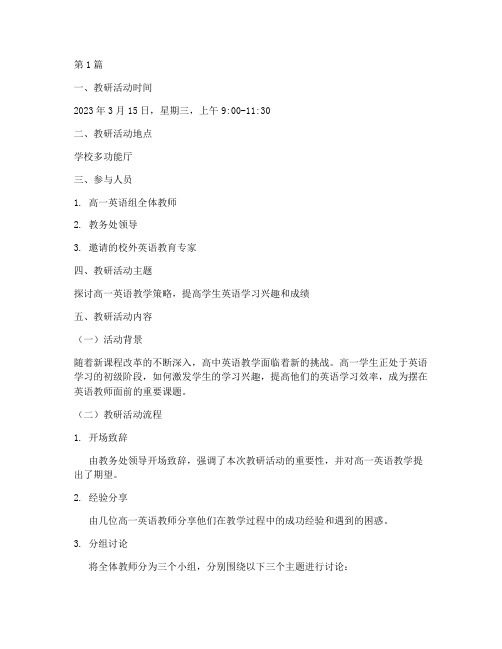
第1篇一、教研活动时间2023年3月15日,星期三,上午9:00-11:30二、教研活动地点学校多功能厅三、参与人员1. 高一英语组全体教师2. 教务处领导3. 邀请的校外英语教育专家四、教研活动主题探讨高一英语教学策略,提高学生英语学习兴趣和成绩五、教研活动内容(一)活动背景随着新课程改革的不断深入,高中英语教学面临着新的挑战。
高一学生正处于英语学习的初级阶段,如何激发学生的学习兴趣,提高他们的英语学习效率,成为摆在英语教师面前的重要课题。
(二)教研活动流程1. 开场致辞由教务处领导开场致辞,强调了本次教研活动的重要性,并对高一英语教学提出了期望。
2. 经验分享由几位高一英语教师分享他们在教学过程中的成功经验和遇到的困惑。
3. 分组讨论将全体教师分为三个小组,分别围绕以下三个主题进行讨论:- 如何激发高一学生的英语学习兴趣?- 如何提高高一学生的英语听说能力?- 如何在课堂教学中融入文化元素,提高学生的文化素养?4. 成果展示各小组汇报讨论成果,其他教师进行点评和补充。
5. 专家讲座邀请校外英语教育专家进行专题讲座,分享先进的英语教学理念和方法。
6. 总结发言由教研组长对本次教研活动进行总结,并对今后的教学工作提出要求。
(三)教研活动内容详细记录1. 经验分享环节- 张老师:通过设置情景,让学生在真实语境中运用英语,提高他们的学习兴趣。
- 李老师:采用小组合作学习的方式,培养学生的团队协作能力,同时提高他们的英语听说能力。
- 王老师:注重培养学生的自主学习能力,鼓励他们在课外进行英语阅读和写作。
2. 分组讨论环节- 激发高一学生的英语学习兴趣- 通过引入生动有趣的教学素材,如歌曲、电影、故事等,提高学生的学习兴趣。
- 开展丰富多彩的英语活动,如英语角、英语演讲比赛等,让学生在活动中感受英语的魅力。
- 针对不同学生的学习风格,采用个性化的教学方法,让每个学生都能找到适合自己的学习方式。
- 提高高一学生的英语听说能力- 创设真实的语言环境,让学生多听多说,提高他们的听说能力。
高中英语主题教研活动(3篇)

第1篇一、活动背景随着新课程改革的不断深入,高中英语教学面临着前所未有的挑战和机遇。
为了提高高中英语教学质量,提升教师的专业素养,我校决定开展以“提升高中英语教学效果”为主题的教研活动。
本次活动旨在通过研讨、交流和实践,探讨新课程背景下高中英语教学的有效策略,促进教师专业成长,推动学校英语教学水平的整体提升。
二、活动目标1. 提高教师对高中英语新课程标准的认识和理解;2. 探索和总结高中英语教学的有效策略和方法;3. 促进教师之间的交流与合作,形成良好的教学研究氛围;4. 提升教师的专业素养和教学能力,提高高中英语教学质量。
三、活动时间2022年10月15日-2022年11月15日四、活动内容1. 专家讲座邀请知名英语教育专家进行专题讲座,内容涉及新课程背景下的高中英语教学理念、教学方法、教学评价等。
2. 课例研讨组织教师进行课例研讨,通过观摩优秀课例,分析课堂教学中的优点和不足,探讨提高教学效果的方法。
3. 教学实践组织教师开展教学实践活动,将研讨成果应用于实际教学中,并进行反思和总结。
4. 教学经验交流邀请优秀教师在活动中分享自己的教学经验,包括教学设计、教学方法、教学评价等方面。
5. 教学反思要求教师撰写教学反思,总结自己在教学过程中的收获和不足,提出改进措施。
五、活动安排1. 第一阶段(10月15日-10月20日):专家讲座邀请专家进行专题讲座,时间为2天,讲座内容如下:(1)新课程背景下的高中英语教学理念与策略;(2)高中英语课堂教学设计;(3)高中英语教学评价。
2. 第二阶段(10月21日-10月27日):课例研讨组织教师观摩优秀课例,并进行研讨,时间为5天。
研讨内容包括:(1)分析优秀课例的教学设计、教学方法、教学评价;(2)讨论提高教学效果的方法;(3)提出改进措施。
3. 第三阶段(10月28日-11月3日):教学实践组织教师开展教学实践活动,时间为5天。
要求教师将研讨成果应用于实际教学中,并进行反思和总结。
高一英语教研过程记录(3篇)

第1篇一、教研背景随着新课程改革的深入推进,高中英语教学面临着新的挑战和机遇。
为了提高高一英语教学质量,促进教师专业成长,我校英语教研组于2023年3月开展了为期一个月的高一英语教研活动。
本次教研活动旨在通过集体备课、教学观摩、研讨交流等方式,提升教师的教学能力和专业素养。
二、教研目标1. 提高教师对新课程标准的理解和把握能力。
2. 优化课堂教学设计,提升课堂教学效率。
3. 促进教师之间的交流与合作,形成良好的教研氛围。
4. 培养学生的英语学习兴趣,提高学生的英语综合运用能力。
三、教研过程(一)集体备课阶段1. 备课内容:围绕高一英语新教材,针对不同单元的教学内容,进行集体备课。
备课内容包括教学目标、教学重难点、教学方法、教学手段等。
2. 备课形式:教研组采用“主备人+研讨”的形式进行备课。
主备人负责备课初稿,其他教师参与讨论,提出修改意见。
3. 备课成果:经过多次研讨,形成了各单元的教学设计方案,包括教学课件、教学活动设计等。
(二)教学观摩阶段1. 观摩内容:教研组组织教师进行教学观摩,观摩内容为高一英语新教材的典型课例。
2. 观摩形式:教师分为观摩组和评课组,观摩组教师认真聆听观摩课,评课组教师课后进行点评。
3. 观摩成果:通过观摩,教师们对课堂教学有了更深入的认识,对教学设计、教学方法等方面有了新的启发。
(三)研讨交流阶段1. 研讨主题:针对观摩课例,教研组组织教师进行研讨交流,主题包括教学目标、教学重难点、教学方法、教学评价等。
2. 研讨形式:教师们围绕主题进行分组讨论,分享自己的教学经验和心得。
3. 研讨成果:教师们对课堂教学有了更深刻的认识,形成了共识,为今后的教学提供了参考。
四、教研成果1. 教师对新课程标准的理解和把握能力得到提升。
2. 教学设计方案更加科学合理,课堂教学效率得到提高。
3. 教师之间的交流与合作更加密切,教研氛围更加浓厚。
4. 学生的英语学习兴趣得到激发,英语综合运用能力得到提高。
高中英语组教研活动记录教研内容

高中英语组教研活动记录教研内容
高中英语组教研活动记录
一、教研内容:
1. 本次教研活动的主题为“实施新课程标准,全面提高教学质量”;
2. 结合教研组特定情况,分享新课程标准高中英语授课及教学要求;
3. 深入探究新课程标准下的课堂教学,梳理教学思路及教学方法,提出合理的改进建议;
4. 经过多位老师的精心展示与讨论,探讨具体的教学实施细节,总结有价值的教学策略。
二、参会人员:
本次教研会议参会人员有英语组全体教师及值班领导。
三、教研活动流程:
1. 首先,由值班领导负责人简要介绍新课程标准的教学要求;
2. 然后,老师们根据自己的教学实践经验,现场讨论新课程标准下的课堂教学,共同探讨更有效的课堂教学模式;
3. 每位老师根据自己的情况,分享自己的教学经验和想法;
4. 教研会议结束后,全体参会老师针对本次活动的成果,签字确认,并留下相关的反馈意见。
四、教研活动的成果:
(1)所有参会老师深入探讨新课程标准下的课堂教学,共同探
讨更有效的课堂教学模式,讨论具体的教学实施细节,形成了一套完整的新课程标准教学方案;
(2)本次教研会议丰富了所有参会老师的实践经验,更好的指导教学,促进了新课程标准在本校的落实;
(3)教研会议结束后,全体参会老师签字确认,留下了相关的反馈意见,为今后教育教学活动提供了有益的建议。
高一英语备课组教研记录(3篇)
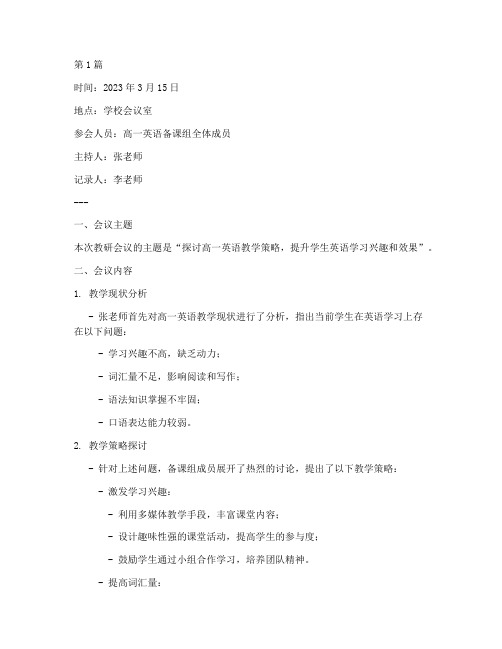
第1篇时间:2023年3月15日地点:学校会议室参会人员:高一英语备课组全体成员主持人:张老师记录人:李老师---一、会议主题本次教研会议的主题是“探讨高一英语教学策略,提升学生英语学习兴趣和效果”。
二、会议内容1. 教学现状分析- 张老师首先对高一英语教学现状进行了分析,指出当前学生在英语学习上存在以下问题:- 学习兴趣不高,缺乏动力;- 词汇量不足,影响阅读和写作;- 语法知识掌握不牢固;- 口语表达能力较弱。
2. 教学策略探讨- 针对上述问题,备课组成员展开了热烈的讨论,提出了以下教学策略:- 激发学习兴趣:- 利用多媒体教学手段,丰富课堂内容;- 设计趣味性强的课堂活动,提高学生的参与度;- 鼓励学生通过小组合作学习,培养团队精神。
- 提高词汇量:- 制定合理的词汇学习计划,让学生循序渐进地学习;- 通过阅读、写作等多种途径巩固词汇;- 定期进行词汇测试,检查学习效果。
- 强化语法知识:- 采用直观易懂的教学方法,帮助学生理解语法规则;- 通过大量的练习,让学生熟练掌握语法知识;- 定期进行语法测试,巩固学习成果。
- 提升口语表达能力:- 创设真实的语言环境,让学生有机会进行口语交流;- 鼓励学生参加英语角、演讲比赛等活动,提高口语表达能力;- 定期进行口语测试,评估学习效果。
3. 教学资源整合- 为了更好地实施教学策略,备课组成员一致认为需要整合教学资源:- 整合教材、教辅资料,形成完整的教学体系;- 利用网络资源,丰富教学内容;- 制作教学课件,提高教学效率。
4. 教学评价改革- 备课组成员一致认为,传统的教学评价方式存在一定的问题,需要改革: - 建立多元化的评价体系,关注学生的全面发展;- 采用过程性评价和结果性评价相结合的方式,全面评估学生的学习成果; - 鼓励学生自我评价和相互评价,提高学生的自我管理能力。
三、会议总结张老师对本次教研会议进行了总结,强调了以下几点:- 高一英语教学要注重激发学生的学习兴趣,提高他们的学习动力;- 教师要善于整合教学资源,提高教学效率;- 要改革教学评价方式,关注学生的全面发展。
英语组教研活动记录高中(3篇)
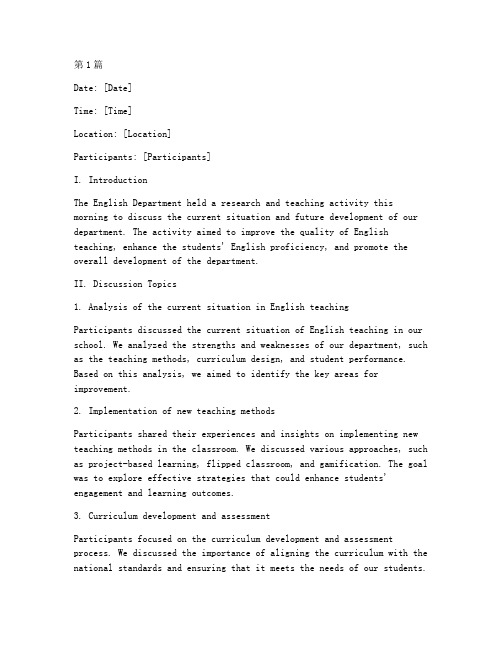
第1篇Date: [Date]Time: [Time]Location: [Location]Participants: [Participants]I. IntroductionThe English Department held a research and teaching activity this morning to discuss the current situation and future development of our department. The activity aimed to improve the quality of English teaching, enhance the students' English proficiency, and promote the overall development of the department.II. Discussion Topics1. Analysis of the current situation in English teachingParticipants discussed the current situation of English teaching in our school. We analyzed the strengths and weaknesses of our department, such as the teaching methods, curriculum design, and student performance. Based on this analysis, we aimed to identify the key areas for improvement.2. Implementation of new teaching methodsParticipants shared their experiences and insights on implementing new teaching methods in the classroom. We discussed various approaches, such as project-based learning, flipped classroom, and gamification. The goal was to explore effective strategies that could enhance students' engagement and learning outcomes.3. Curriculum development and assessmentParticipants focused on the curriculum development and assessment process. We discussed the importance of aligning the curriculum with the national standards and ensuring that it meets the needs of our students.Additionally, we explored different assessment methods to evaluate students' progress and provide constructive feedback.4. Teacher development and professional growthParticipants emphasized the importance of teacher development and professional growth. We shared ideas on how to foster a collaborativeand supportive learning environment, encourage continuous learning, and provide opportunities for teachers to enhance their skills and knowledge.III. Key Points of Discussion1. Strengthening the basic skills of English teachingParticipants agreed that it is crucial to lay a solid foundation in English teaching. This includes focusing on grammar, vocabulary, reading, writing, and speaking skills. We discussed various activities and techniques that could help students improve their basic skills.2. Promoting innovative teaching methodsParticipants advocated for the adoption of innovative teaching methodsto engage students and make learning more enjoyable. We shared examples of successful practices and encouraged teachers to experiment with new approaches to enhance student engagement and motivation.3. Emphasizing the importance of assessmentParticipants emphasized the significance of assessment in monitoring student progress and identifying areas for improvement. We discussed the use of formative and summative assessments, and how to provide constructive feedback to students.4. Fostering a collaborative and supportive learning environmentParticipants highlighted the importance of fostering a collaborative and supportive learning environment within the department. We discussed ways to encourage teamwork, share resources, and support each other's professional growth.IV. Action PlanBased on the discussions, the following action plan was proposed:1. Develop a comprehensive curriculum that aligns with the national standards and meets the needs of our students.2. Implement innovative teaching methods and encourage teachers to experiment with new approaches.3. Provide professional development opportunities for teachers to enhance their skills and knowledge.4. Establish a collaborative and supportive learning environment within the department.5. Monitor student progress through regular assessments and provide constructive feedback.V. ConclusionThe research and teaching activity provided a valuable opportunity for the English Department to reflect on its current practices and identify areas for improvement. By adopting the proposed action plan, we aim to enhance the quality of English teaching, improve student performance, and promote the overall development of our department. The continuous effort and dedication of all teachers and staff are essential in achieving these goals.[Signatures of participants]第2篇Date: [Insert Date]Time: [Insert Time]Location: [Insert Location]Attendees: [Insert Names of Attendees]Facilitator: [Insert Name of Facilitator]---I. IntroductionThe English Department of [Insert School Name] held its monthly research and development activity on [Insert Date]. The meeting was organized to discuss recent teaching strategies, share insights on student performance, and explore innovative approaches to enhance the English language curriculum. The facilitator for the session was [Facilitator's Name], who ensured a productive and engaging discussion among the department members.---II. Opening RemarksThe meeting commenced with a brief opening address by [Facilitator's Name], who emphasized the importance of continuous improvement in teaching methods and curriculum design. The facilitator highlighted the need for collective effort to address the diverse needs of our students and to prepare them for the challenges of higher education and the global workforce.---III. Review of Recent Teaching Strategies1. Group Work and Collaboration: The group discussed the effectiveness of incorporating group work and collaboration into English classes. Members shared their experiences and findings, with some highlighting the positive impact on student engagement and peer learning. It was agreed that more structured group activities should be planned to ensure inclusivity and to provide clear guidelines for collaboration.2. Flipped Classroom Model: The facilitator presented a case study on the flipped classroom model, where students are expected to watch instructional videos at home and come to class prepared to engage in discussions and activities. Several members expressed enthusiasm about trying this model, while others raised concerns about potential challenges, such as ensuring students complete the pre-classwork. A working group was formed to develop a pilot flipped classroom project.3. Technology Integration: The department acknowledged the growing role of technology in language learning. A discussion on the use of educational apps and online platforms led to the formation of a subcommittee tasked with reviewing and recommending the most effective tools for classroom use.---IV. Student Performance Analysis1. Grading and Assessment: Members of the department reviewed the current grading system and discussed its effectiveness. Concerns were raised regarding the subjectivity of certain assessments and the needfor more objective measures. It was suggested that the department explore the use of standardized tests and rubrics to ensure consistency in grading.2. Identifying Learning Gaps: The group shared insights on identifying and addressing learning gaps among students. Strategies such as formative assessments, one-on-one meetings with students, and targeted interventions were discussed. The importance of early intervention was emphasized to prevent falling behind.3. Parental Involvement: The need for increased parental involvement in their child's education was highlighted. The department agreed to develop a communication plan to keep parents informed about theirchild's progress and to encourage them to support their child's language learning at home.---V. Innovative Approaches to Teaching1. Project-Based Learning: The facilitator introduced the concept of project-based learning (PBL) and its potential benefits in the English classroom. Members discussed various PBL projects that could be implemented, such as creating a school newsletter or organizing a cultural exchange program.2. Cultural Exchange Programs: The group explored the possibility of establishing cultural exchange programs with schools in other countries. This would provide students with an opportunity to learn about different cultures and improve their language skills through real-world interactions.3. Student-Led Conferences: The department discussed the idea of implementing student-led conferences, where students take an active role in discussing their progress and setting goals with their teachers. This approach was seen as a way to empower students and promote self-reflection.---VI. Action Plan1. Flipped Classroom Pilot: The working group tasked with developing a flipped classroom project will meet weekly to discuss progress and share resources.2. Technology Integration Committee: The subcommittee will meet bi-weekly to review educational apps and online platforms and make recommendations for classroom use.3. Parental Involvement Plan: The department will develop a communication plan and schedule a meeting with parents to discuss ways they can support their child's language learning.4. PBL Projects: The department will brainstorm and select PBL projects to be implemented in the upcoming semester.---VII. ConclusionThe monthly research and development activity concluded with a summary of the key points discussed and an agreement on the action plan moving forward. The facilitator expressed gratitude to all members for their participation and commitment to improving the English language curriculum. The department looks forward to implementing the proposedstrategies and evaluating their effectiveness in enhancing student learning and achievement.---End of Record第3篇Date: March 15, 2023Time: 2:00 PM - 5:00 PMLocation: School Library, Main BuildingParticipants: All English teachers of Grade 10-12Facilitator: Mr. John Smith, Department Head---I. IntroductionThe English Department held a research and development (R&D) activity today to discuss and enhance our teaching methodologies, student engagement strategies, and assessment practices. The objective was to ensure that our teaching aligns with the latest educational trends and effectively caters to the diverse needs of our students.---II. Opening RemarksMr. John Smith, the Department Head, opened the session by emphasizing the importance of continuous improvement and professional development in the teaching of English. He highlighted the need for innovation and collaboration to keep our curriculum relevant and engaging.---III. Presentation on Digital LearningMs. Sarah Johnson, a technology integration specialist, presented on the benefits of incorporating digital tools into our English lessons. She showcased various platforms and applications that can be used for interactive learning, such as Kahoot!, Quizizz, and Google Classroom. The teachers were encouraged to experiment with these tools to maketheir lessons more dynamic and student-centered.Key Points:- Digital learning can enhance student engagement and motivation.- It allows for personalized learning experiences.- Teachers should be trained on how to effectively use these tools.---IV. Discussion on Assessment PracticesDr. Emily White, an experienced educator and assessment expert, led a discussion on the importance of effective assessment in the English classroom. The teachers shared their current assessment methods and challenges they face. Dr. White provided insights on various assessment techniques, including formative and summative assessments, and the importance of rubrics in grading.Key Points:- Formative assessments should be used to monitor student progress and provide feedback.- Summative assessments should be designed to measure student learning outcomes.- Rubrics can help ensure consistency and fairness in grading.---V. Student Engagement StrategiesMr. Michael Brown, a senior English teacher, shared his successful strategies for engaging students in the classroom. He discussed the useof project-based learning, collaborative group work, and interactive discussions. The teachers were encouraged to incorporate thesestrategies into their lessons to promote active learning and critical thinking.Key Points:- Project-based learning encourages students to apply their knowledge in real-world contexts.- Collaborative group work fosters teamwork and communication skills.- Interactive discussions promote critical thinking and deep understanding.---VI. Peer Review and FeedbackThe teachers engaged in a peer review session, where they shared their lesson plans and received constructive feedback from their colleagues. This interactive session aimed to identify areas for improvement and to inspire each other with innovative teaching ideas.Key Points:- Peer review encourages professional growth and collaboration.- Constructive feedback can help improve teaching methods and student outcomes.- Sharing ideas promotes a culture of innovation within the department.---VII. Closing RemarksMr. John Smith concluded the session by summarizing the key takeaways and emphasizing the importance of implementing the discussed strategies in our daily teaching practices. He encouraged the teachers to continue their professional development and to seek support from the department whenever needed.---VIII. Action PlanTo ensure the successful implementation of the discussed strategies, the following action plan was proposed:1. Training Sessions: Organize regular training sessions for teachers on digital tools and assessment techniques.2. Curriculum Updates: Regularly review and update the curriculum to incorporate new teaching methods and resources.3. Resource Sharing: Create a shared platform for teachers to share lesson plans, resources, and best practices.4. Student Feedback: Conduct periodic surveys to gather student feedback on teaching methods and classroom environment.---IX. ConclusionThe English Department's R&D activity was a productive and inspiring session that provided valuable insights and practical strategies for enhancing our teaching practices. By embracing innovation and collaboration, we are confident that we can provide our students with a rich and engaging learning experience that prepares them for success in their academic and professional lives.。
高中英语教研专题活动记录
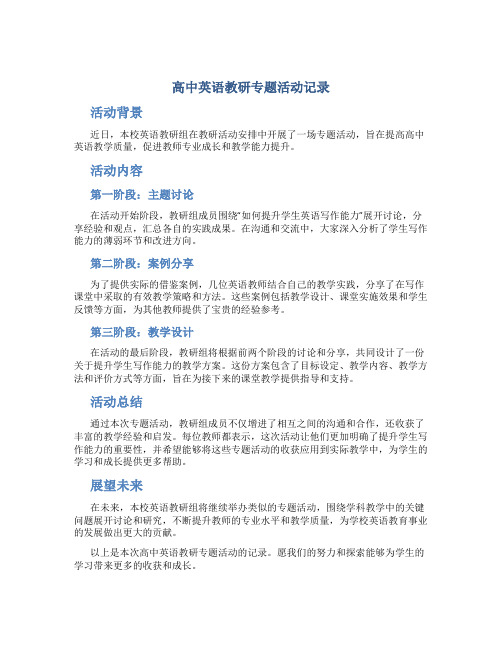
高中英语教研专题活动记录
活动背景
近日,本校英语教研组在教研活动安排中开展了一场专题活动,旨在提高高中英语教学质量,促进教师专业成长和教学能力提升。
活动内容
第一阶段:主题讨论
在活动开始阶段,教研组成员围绕“如何提升学生英语写作能力”展开讨论,分享经验和观点,汇总各自的实践成果。
在沟通和交流中,大家深入分析了学生写作能力的薄弱环节和改进方向。
第二阶段:案例分享
为了提供实际的借鉴案例,几位英语教师结合自己的教学实践,分享了在写作课堂中采取的有效教学策略和方法。
这些案例包括教学设计、课堂实施效果和学生反馈等方面,为其他教师提供了宝贵的经验参考。
第三阶段:教学设计
在活动的最后阶段,教研组将根据前两个阶段的讨论和分享,共同设计了一份关于提升学生写作能力的教学方案。
这份方案包含了目标设定、教学内容、教学方法和评价方式等方面,旨在为接下来的课堂教学提供指导和支持。
活动总结
通过本次专题活动,教研组成员不仅增进了相互之间的沟通和合作,还收获了丰富的教学经验和启发。
每位教师都表示,这次活动让他们更加明确了提升学生写作能力的重要性,并希望能够将这些专题活动的收获应用到实际教学中,为学生的学习和成长提供更多帮助。
展望未来
在未来,本校英语教研组将继续举办类似的专题活动,围绕学科教学中的关键问题展开讨论和研究,不断提升教师的专业水平和教学质量,为学校英语教育事业的发展做出更大的贡献。
以上是本次高中英语教研专题活动的记录。
愿我们的努力和探索能够为学生的学习带来更多的收获和成长。
高中英语活动教研记录

一、教研背景随着我国教育改革的不断深入,高中英语教学也在不断探索和创新。
为了提高英语教学质量,激发学生学习英语的兴趣,培养学生的英语实际运用能力,我校英语教研组于近期开展了一系列英语活动教研活动。
以下是本次教研活动的详细记录。
二、教研内容1. 英语活动设计本次教研活动主要围绕英语活动设计展开,旨在提高教师活动设计的创新性和实用性。
教研组邀请了具有丰富教学经验的教师分享他们的活动设计案例,并组织教师们进行讨论和交流。
2. 英语活动实施在活动实施环节,教师们分享了他们在课堂中实施英语活动的经验和心得。
同时,针对活动实施过程中遇到的问题,大家共同探讨解决方案,以达到提高活动效果的目的。
3. 英语活动评价英语活动评价是本次教研活动的重要环节。
教师们共同探讨了如何对英语活动进行科学、合理的评价,以提高活动的质量和效果。
三、教研过程1. 活动准备在活动开始前,教研组长组织教师们进行活动前的准备工作。
首先,确定活动主题,明确活动目标;其次,制定活动方案,包括活动内容、时间、地点、参与人员等;最后,准备活动所需的材料。
2. 活动开展(1)英语活动设计在英语活动设计环节,教师们积极参与,纷纷提出自己的活动设计思路。
针对不同主题,教师们设计了丰富多彩的活动,如:角色扮演、小组讨论、英语演讲、英语歌曲演唱等。
(2)英语活动实施在活动实施环节,教师们分享了他们在课堂中实施英语活动的经验和心得。
大家一致认为,在活动实施过程中,要注重学生的参与度,激发学生的学习兴趣,使学生在活动中提高英语实际运用能力。
(3)英语活动评价在英语活动评价环节,教师们共同探讨了如何对英语活动进行科学、合理的评价。
大家认为,评价应从活动目标、活动内容、活动过程、活动效果等方面进行综合评价,以全面了解活动的质量和效果。
3. 活动总结活动结束后,教研组长组织教师们进行活动总结。
首先,对本次活动进行回顾,总结活动中的亮点和不足;其次,针对活动中的问题,提出改进措施;最后,对今后的英语活动提出建议。
高中英语教研组活动记录(3篇)
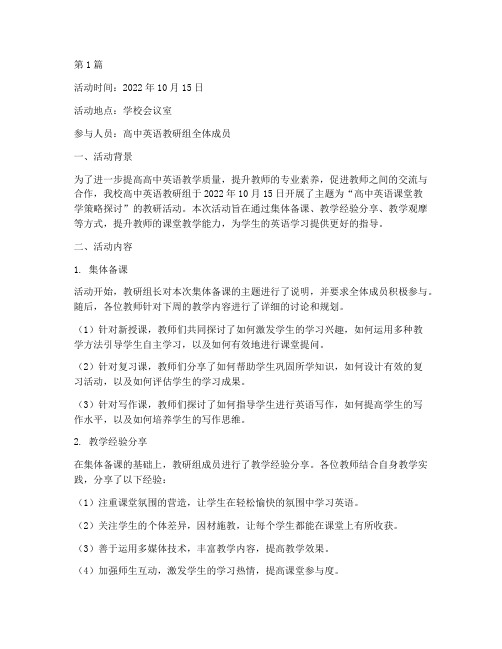
第1篇活动时间:2022年10月15日活动地点:学校会议室参与人员:高中英语教研组全体成员一、活动背景为了进一步提高高中英语教学质量,提升教师的专业素养,促进教师之间的交流与合作,我校高中英语教研组于2022年10月15日开展了主题为“高中英语课堂教学策略探讨”的教研活动。
本次活动旨在通过集体备课、教学经验分享、教学观摩等方式,提升教师的课堂教学能力,为学生的英语学习提供更好的指导。
二、活动内容1. 集体备课活动开始,教研组长对本次集体备课的主题进行了说明,并要求全体成员积极参与。
随后,各位教师针对下周的教学内容进行了详细的讨论和规划。
(1)针对新授课,教师们共同探讨了如何激发学生的学习兴趣,如何运用多种教学方法引导学生自主学习,以及如何有效地进行课堂提问。
(2)针对复习课,教师们分享了如何帮助学生巩固所学知识,如何设计有效的复习活动,以及如何评估学生的学习成果。
(3)针对写作课,教师们探讨了如何指导学生进行英语写作,如何提高学生的写作水平,以及如何培养学生的写作思维。
2. 教学经验分享在集体备课的基础上,教研组成员进行了教学经验分享。
各位教师结合自身教学实践,分享了以下经验:(1)注重课堂氛围的营造,让学生在轻松愉快的氛围中学习英语。
(2)关注学生的个体差异,因材施教,让每个学生都能在课堂上有所收获。
(3)善于运用多媒体技术,丰富教学内容,提高教学效果。
(4)加强师生互动,激发学生的学习热情,提高课堂参与度。
3. 教学观摩为了更好地提升教师的课堂教学能力,教研组安排了教学观摩环节。
一位经验丰富的教师展示了她的英语课堂,全体成员观摩并进行了点评。
(1)课堂氛围活跃,教师与学生互动频繁,学生参与度高。
(2)教学设计合理,教学内容丰富,教学方法多样。
(3)注重培养学生的英语思维,提高学生的英语实际应用能力。
(4)课堂评价及时、准确,有助于学生及时发现并改正错误。
三、活动总结1. 本次教研活动取得了圆满成功,教师们在活动中积极参与,分享了丰富的教学经验,提高了自身的教学水平。
高中英语教研活动过程记录
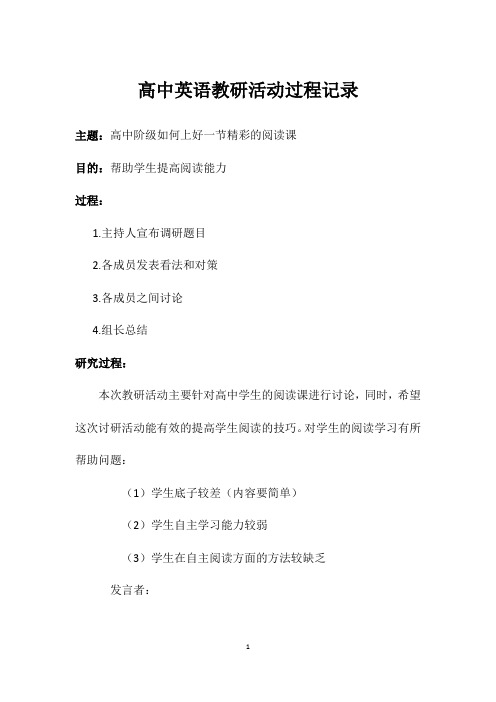
高中英语教研活动过程记录
主题:高中阶级如何上好一节精彩的阅读课
目的:帮助学生提高阅读能力
过程:
1.主持人宣布调研题目
2.各成员发表看法和对策
3.各成员之间讨论
4.组长总结
研究过程:
本次教研活动主要针对高中学生的阅读课进行讨论,同时,希望这次讨研活动能有效的提高学生阅读的技巧。
对学生的阅读学习有所帮助问题:
(1)学生底子较差(内容要简单)
(2)学生自主学习能力较弱
(3)学生在自主阅读方面的方法较缺乏
发言者:
朱老师:
(1)环节要全
(2)内容要简单
(3)重点难点分明
赵老师:
(1)趣味性
(2)层次性明确
陈老师:
(1)小组讨论
(2)多练习
岳老师:
(1)导入要精彩
(2)多提问学生
组长总结:结合学生本身特点,多讲,多交流。
应多鼓励学习,认真学习英语。
小结:本次就提出的问题,一对一各成员之间进行了总结。
能有效的提高学生的阅读能力,在练习方面更多的注重方法与知识的结合。
本次调研是一次有意义的活动。
某中学英语教研组
某年某月某日。
教研记录英语高中(3篇)

第1篇一、教研背景随着新课程改革的不断深入,英语教学面临着新的挑战和机遇。
为了提高英语教学质量,我校英语教研组积极开展教研活动,通过集体备课、听课评课、教学反思等方式,不断优化教学策略,提高教师的专业素养。
以下是本学期英语教研组的教学实践与反思。
二、教研内容1. 集体备课(1)备课内容:本学期英语教研组以人教版高中英语教材为基础,针对不同年级、不同模块的教学内容,进行集体备课。
(2)备课形式:采用“主备人+讨论”的形式,主备人负责解读教材、设计教学方案,其他教师提出意见和建议,共同完善教学设计。
(3)备课成果:形成了较为完善的备课资料,包括教学目标、教学重难点、教学过程、教学评价等。
2. 听课评课(1)听课对象:本学期英语教研组共组织了10次听课活动,涵盖不同年级、不同教师的教学。
(2)听课内容:主要针对教学设计、教学方法、课堂管理、学生参与度等方面进行评价。
(3)评课形式:采用“教师自评+同行互评”的形式,教师对自己和同事的教学进行评价,并提出改进意见。
3. 教学反思(1)反思内容:教师针对自己的教学实践,从教学设计、教学方法、课堂管理、学生评价等方面进行反思。
(2)反思形式:采用“教学日志+案例分析”的形式,教师记录自己的教学过程,分析教学中的优点和不足。
(3)反思成果:教师们对教学有了更深入的认识,明确了自身在教学中的优势和不足,为今后的教学提供了改进方向。
三、教研成果1. 教学质量提升:通过集体备课、听课评课、教学反思等活动,教师们的教学水平得到了显著提高,学生的英语成绩稳步提升。
2. 教师专业素养提升:教师们在教研活动中,不断学习、交流、反思,专业素养得到了全面提升。
3. 教学资源丰富:通过集体备课,形成了丰富的教学资源,为教师们的教学提供了有力支持。
四、教研反思1. 集体备课的深度和广度有待提高:虽然本学期开展了集体备课活动,但部分教师在备课过程中,对教材的解读和教学设计的创新性还有待提高。
高中英语教研组活动记录XX年3月17日英语教研组活动主要内容

高中英语教研组活动记录XX年3月17日英语教研组活动主
要内容
高中英语教研组活动记录XX年3月17日英语教研组活动主要内容
一、总体目标
1. 讨论教学案的制定
不必拘泥于形式,要灵活制定,根据需要增减内容,各个年级组讨论制定适合自己年级组的学案。
2. 研讨双周教研活动的内容和主题,务必让教研活动有实效。
3. 讨论推荐一位教师做岗位聘任代表
4. 请豆云燕、倪桂业传达县高三教学研讨的精神。
二、研讨提高高三二轮复习效率的方法
1. 在一轮、二轮的过渡阶段,要知识和技能兼顾,做到知识的积累和能力的提升同步增长。
2. 任何时候都不能放弃语篇阅读的能力的训练。
3. 如何高效率的把县中心备课组制定的学案应用于课堂。
4. 优化课堂教学的结构,争取高效的达成每节课的教学目标。
三、分组讨论
1. 如何从整体上提高我校的英语成绩,缩小与兄弟高中之间的差距
2. 教师如何获得自身的专业发展
一、总体目标
1. 讨论教学案的制定
不必拘泥于形式,要灵活制定,根据需要增减内容,各个年级组讨论制定适合自己年级组的学案。
2. 研讨双周教研活动的内容和主题,务必让教研活动有实效。
3. 讨论推荐一位教师做岗位聘任代表
4. 请豆云燕、倪桂业传达县高三教学研讨的精神。
二、研讨提高高三二轮复习效率的方法
1. 在一轮、二轮的过渡阶段,要知识和技能兼顾,做到知识的积累和能力的提升同步增长。
2. 任何时候都不能放弃语篇阅读的能力的训练。
3. 如何高效率的把县中心备课组制定的学案应用于课堂。
4. 优化课堂教学的结构,争取高效的达成每。
高二高中英语教研记录(3篇)
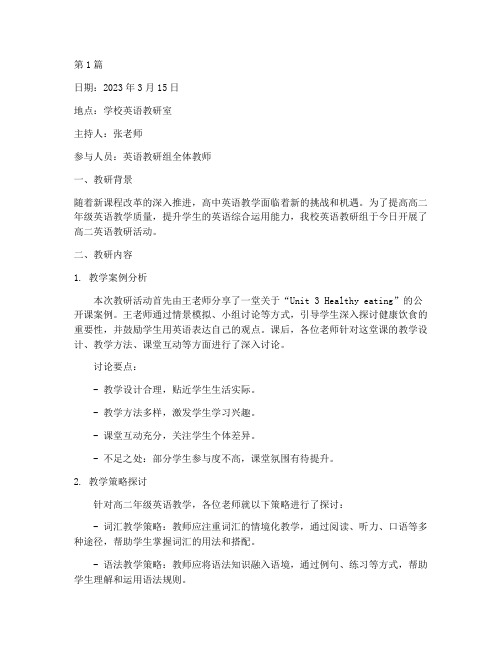
第1篇日期:2023年3月15日地点:学校英语教研室主持人:张老师参与人员:英语教研组全体教师一、教研背景随着新课程改革的深入推进,高中英语教学面临着新的挑战和机遇。
为了提高高二年级英语教学质量,提升学生的英语综合运用能力,我校英语教研组于今日开展了高二英语教研活动。
二、教研内容1. 教学案例分析本次教研活动首先由王老师分享了一堂关于“Unit 3 Healthy eating”的公开课案例。
王老师通过情景模拟、小组讨论等方式,引导学生深入探讨健康饮食的重要性,并鼓励学生用英语表达自己的观点。
课后,各位老师针对这堂课的教学设计、教学方法、课堂互动等方面进行了深入讨论。
讨论要点:- 教学设计合理,贴近学生生活实际。
- 教学方法多样,激发学生学习兴趣。
- 课堂互动充分,关注学生个体差异。
- 不足之处:部分学生参与度不高,课堂氛围有待提升。
2. 教学策略探讨针对高二年级英语教学,各位老师就以下策略进行了探讨:- 词汇教学策略:教师应注重词汇的情境化教学,通过阅读、听力、口语等多种途径,帮助学生掌握词汇的用法和搭配。
- 语法教学策略:教师应将语法知识融入语境,通过例句、练习等方式,帮助学生理解和运用语法规则。
- 阅读教学策略:教师应引导学生掌握阅读技巧,提高阅读速度和理解能力,同时关注学生的阅读兴趣和阅读习惯的培养。
- 写作教学策略:教师应注重写作方法的指导,引导学生进行有效的思维训练,提高写作水平。
3. 教学资源整合为了丰富教学内容,提高教学质量,各位老师就教学资源的整合进行了讨论:- 利用网络资源,如在线课程、教学视频等,丰富课堂内容。
- 引进优秀的英语教材,提高教材质量。
- 组织学生参加英语角、英语演讲比赛等活动,提高学生的英语实际运用能力。
三、教研总结本次教研活动取得了圆满成功。
通过教学案例分析、教学策略探讨、教学资源整合等环节,各位老师对高二年级英语教学有了更深入的认识,为今后的教学工作提供了有益的借鉴。
高三英语下教研活动记录(3篇)

第1篇一、活动时间:2023年3月15日二、活动地点:学校多功能厅三、活动主题:高三英语下学期教学策略研讨四、参与人员:高三英语教研组全体教师五、活动记录:一、活动背景随着新学期的开始,高三英语教学进入了关键时期。
为了更好地提高教学质量,提升学生的英语成绩,我校高三英语教研组于2023年3月15日举行了高三英语下学期教学策略研讨活动。
本次活动旨在通过集体讨论,总结高三英语教学经验,探索新的教学方法,为接下来的教学工作提供有力支持。
二、活动内容1. 分析当前高三英语教学现状首先,教研组长对当前高三英语教学现状进行了分析。
她指出,目前高三英语教学存在以下问题:(1)学生对英语学习的兴趣不高,学习动力不足;(2)基础知识掌握不牢固,导致阅读、写作、听力等方面存在困难;(3)课堂效率不高,部分学生参与度低;(4)教师对学生的个性化辅导不足。
2. 探讨高三英语下学期教学策略针对以上问题,教研组成员展开了热烈的讨论,提出了以下教学策略:(1)激发学生学习兴趣,提高学习动力教师可以通过丰富多样的教学方法,如情景教学、游戏教学、竞赛教学等,激发学生的学习兴趣。
同时,关注学生的个体差异,针对不同层次的学生制定个性化的学习计划,提高学生的学习动力。
(2)夯实基础知识,提高综合运用能力教师应加强对基础知识的讲解和训练,帮助学生牢固掌握词汇、语法等基础知识。
在课堂教学中,注重培养学生的阅读、写作、听力等综合运用能力,提高学生的英语水平。
(3)优化课堂教学,提高课堂效率教师应合理安排课堂时间,确保每节课都有明确的重点和目标。
通过小组合作、讨论等方式,提高学生的参与度,使课堂氛围更加活跃。
同时,教师应关注学生的个体差异,给予个别辅导,提高课堂效率。
(4)加强个性化辅导,关注学生成长教师应针对学生的不同需求,开展个性化辅导,帮助学生解决学习中的难题。
同时,关注学生的心理健康,为学生提供心理支持,助力学生成长。
3. 制定高三英语下学期教学计划根据讨论结果,教研组制定了以下教学计划:(1)加强词汇、语法等基础知识的讲解和训练,提高学生的英语基础;(2)开展阅读、写作、听力等综合能力的训练,提高学生的英语应用能力;(3)优化课堂教学,提高课堂效率,关注学生的个体差异;(4)开展个性化辅导,关注学生成长,提高学生的英语成绩。
- 1、下载文档前请自行甄别文档内容的完整性,平台不提供额外的编辑、内容补充、找答案等附加服务。
- 2、"仅部分预览"的文档,不可在线预览部分如存在完整性等问题,可反馈申请退款(可完整预览的文档不适用该条件!)。
- 3、如文档侵犯您的权益,请联系客服反馈,我们会尽快为您处理(人工客服工作时间:9:00-18:30)。
高中英语教研组活动记录 XX年3月17日英语教研组活动主要内容
一、总体目标
1. 讨论教学案的制定
不必拘泥于形式,要灵活制定,根据需要增减内容,各个年级组讨论制定适合自己年级组的学案。
2. 研讨双周教研活动的内容和主题,务必让教研活动有实效。
3. 讨论推荐一位教师做岗位聘任代表
4. 请豆云燕、倪桂业传达县高三教学研讨的精神。
二、研讨提高高三二轮复习效率的方法
1. 在一轮、二轮的过渡阶段,要知识和技能兼顾,做到知识的积累和能力的提升同步增长。
2. 任何时候都不能放弃语篇阅读的能力的训练。
3. 如何高效率的把县中心备课组制定的学案应用于课堂。
4. 优化课堂教学的结构,争取高效的达成每节课的教学目标。
三、分组讨论
1. 如何从整体上提高我校的英语成绩,缩小与兄弟高中之间的差距
2. 教师如何获得自身的专业发展
一、总体目标
1. 讨论教学案的制定
不必拘泥于形式,要灵活制定,根据需要增减内容,各个年级组讨论制定适合自己年级组的学案。
2. 研讨双周教研活动的内容和主题,务必让教研活动有实效。
3. 讨论推荐一位教师做岗位聘任代表
4. 请豆云燕、倪桂业传达县高三教学研讨的精神。
二、研讨提高高三二轮复习效率的方法
1. 在一轮、二轮的过渡阶段,要知识和技能兼顾,做到知识的积累和能力的提升同步增长。
2. 任何时候都不能放弃语篇阅读的能力的训练。
3. 如何高效率的把县中心备课组制定的学案应用于课堂。
4. 优化课堂教学的结构,争取高效的达成每
节课的教学目标。
三、分组讨论
1. 如何从整体上提高我校的英语成绩,缩小与兄弟高中之间的差距
2. 教师如何获得自身的专业发展
一、总体目标
1. 讨论教学案的制定
不必拘泥于形式,要灵活制定,根据需要增减内容,各个年级组讨论制定适合自己年级组的学案。
2. 研讨双周教研活动的内容和主题,务必让教研活动有实效。
3. 讨论推荐一位教师做岗位聘任代表
4. 请豆云燕、倪桂业传达县高三教学研讨的精神。
二、研讨提高高三二轮复习效率的方法
1. 在一轮、二轮的过渡阶段,要知识和技能兼顾,做到知识的积累和能力的提升同步增长。
2. 任何时候都不能放弃语篇阅读的能力的训练。
3. 如何高效率的把县中心备课组制定的学案
应用于课堂。
4. 优化课堂教学的结构,争取高效的达成每节课的教学目标。
三、分组讨论
1. 如何从整体上提高我校的英语成绩,缩小与兄弟高中之间的差距
2. 教师如何获得自身的专业发展。
